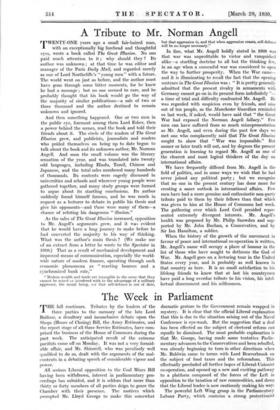A Tribute to Mr. Norman Angell
TWENTY-ONE years ago a small fair-haired man, with an exceptionally big forehead and thoughtful eyes, wrote a book called The Great. Illusion. No one paid much attention to it ; why should they ? Its author was unknown ; at that time he was editor and manager of the Paris Daily Mail, and regarded merely as one of Lord Northcliffe's "young men" with a future. The world went on just as before, and the author must have gone through some bitter moments, for he knew he had a message ; but no one seemed to care, and he probably thought that his book would go the way of the majority of similar publications—a sale of two or three thousand and the author destined to remain unknown and ignored.
And then something happened. One or two men in the public eye, foremost among them Lord Esher, then a power behind the scenes, read the book and told their friends about it. The circle of the readers of The Great Illusion grew, and publicists, journalists and readers who prided themselves on being up to date began to talk about the book and its unknown author, Mr. Norman Angell. And soon the small volume was the literary sensation of the year, and was translated into twenty odd languages, including Hindu, Tamil, Chinese and Japanese, and the total sales numbered many hundreds of thousands. Its contents were eagerly discussed in universities and schools and wherever young people were gathered together, and many study groups were formed to argue about its startling conclusions. Its author suddenly found himself famous, and he was much in request as a lecturer to debate in public his thesis and give his opponents—and there were many of them—a chance of refuting his dangerous " illusion."
As the sales of The Great Illusion increased, opposition to Mr. Angell's arguments grew, and it was evident that he would have a long journey to make before he had converted the majority to his way of thinking. What was the author's main thesis ? (We make use of an extract from a letter he wrote to the Spectator in 1910.) That as a result of mechanical development and improved means of communication, especially the world- wide nature of modern finance, operating through such economic phenomena as " reacting bourses and a synchronized bank rate," " Modem wealth and trade aro intangible in the sense that they cannot he seized or interfered with to the advantage of a military aggressor, the moral being, not that self-defence is out of date, but that aggression is, and that when aggression ceases, self-defence will be no longer necessary."
In fine, what Mr. Angell boldly stated in 1909 was that war was unprofitable to victor and vanquished alike—a startling doctrine to all but the thinking few, in an age when a successful war was considered to open the way to further prosperity. When the War came— and it is illuminating to recall the fact that the opening sentence in The Great Illusion was : " It is pretty generally admitted that the present rivalry in armaments with Germany cannot go on in its present form indefinitely "- a time of trial and difficulty confronted Mr. Angell. He was regarded with suspicion even by friends, and nine out of ten people, as the Manchester Guardian reminded us last week, if asked, would have said that " the Great War had exposed the Norman Angell fallacy." Few men can have suffered from so much misrepresentation as Mr. Angell, and even during the past few days we met one who complacently said that The Great Illusion sought to show that " War was impossible." But sooner or later truth will out, and by degrees the present generation is learning to regard Mr. Angell as one of the clearest and most logical thinkers of the day on international affairs.
We have frequently differed from Mr. Angell in the field of politics, and in some ways we wish that he had never joined any political party ; but we recognize that no one in the present century has done more for creating a saner outlook in international affairs. Few men have had a more genuine and enthusiastic non-party tribute paid to them by their fellows than that which was given to him at the House of Commons last week. The gathering over which Lord Cecil presided repre- sented extremely divergent interests. Mr. Angell's health was proposed by Mr. Philip Snowden and sup- ported by Mr. John Buchan, a Conservative, and by Sir Ian Hamilton, a soldier.
When the history of the growth of the movement in favour of peace and international co-operation is written, Mr. Angell's name will occupy a place of honour in the list of those who have sought to dethrone the God of War. Mr. Angell goes on a lecturing tour in the United States every year, and is probably as well known in that country as here. It is no small satisfaction to his lifelong friends to know that at last his countrymen have paid a long overdue tribute to his vision, his intel- lectual discernment and his selflessness.














































 Previous page
Previous page